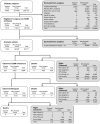Comparative effectiveness of bariatric surgery vs. nonsurgical treatment of type 2 diabetes among severely obese adults
- PMID: 24306153
- PMCID: PMC4632526
- DOI: 10.1016/j.orcp.2012.08.196
Comparative effectiveness of bariatric surgery vs. nonsurgical treatment of type 2 diabetes among severely obese adults
Abstract
Although all weight-loss approaches may improve insulin sensitivity in type 2 diabetes, bariatric surgery is believed to be the only reliable means of achieving diabetes remission. We conducted a retrospective cohort study to compare rates of diabetes remission, relapse and all-cause mortality among severely obese individuals with diabetes who underwent bariatric surgery vs. nonsurgically treated individuals. Severely obese adults with uncontrolled or medication-controlled diabetes who underwent bariatric surgery or received usual medical care from 2005 to 2008 in three health care delivery systems in the United States were eligible. Diabetes status was identified using pharmacy, laboratory, and diagnosis information from electronic medical records. A propensity approach and exclusion criteria identified 1395 adults with diabetes who had bariatric surgery and 62,322 who did not. Most procedures were Roux-en-Y gastric bypass (72.0% laparoscopic; 8.2% open); 4.4% were gastric banding, 2.4% sleeve gastrectomy, and 13.2% were other procedures. At two years, bariatric subjects experienced significantly higher diabetes remission rates [73.7% (95% CI: 70.6, 76.5)] compared to nonsurgical subjects [6.9% (95%CI: 6.9, 7.1)]. Age, site, duration of diabetes, hemoglobin A1c level, and intensity of diabetes medication treatment were significantly associated with remission. Bariatric subjects also experienced lower relapse rates than nonsurgical subjects (adjusted HR: 0.19; 95% CI: 0.15-0.23) with no higher risk of death (adjusted HR: 0.54; 95% CI: 0.22-1.30). We conclude that bariatric surgery can effectively induce remission of diabetes among most severely obese adults, and this treatment approach appears to be superior to nonsurgical treatment in inducing diabetes remission.
© 2013 Asian Oceanian Association for the Study of Obesity . All rights reserved.
Figures


References
-
- Flegal KM, Graubard BI, Williamson DF, Gail MH. Excess deaths associated with underweight, overweight, and obesity. JAMA. 2005 Apr 20;293(15):1861–7. - PubMed
-
- Buchwald H. Consensus conference statement bariatric surgery for morbid obesity: health implications for patients, health professionals, and third-party payers. Surg Obes Relat Dis. 2005 May-Jun;1(3):371–81. - PubMed
-
- Arterburn D. Bariatric surgery. Bmj. 2008;337:a755. - PubMed
-
- Mechanick JI, Kushner RF, Sugerman HJ, Gonzalez-Campoy JM, Collazo-Clavell ML, Spitz AF, et al. American Association of Clinical Endocrinologists, The Obesity Society, and American Society for Metabolic & Bariatric Surgery medical guidelines for clinical practice for the perioperative nutritional, metabolic, and nonsurgical support of the bariatric surgery patient. Obesity (Silver Spring) 2009 Apr;17(Suppl 1):S1–70. v. - PubMed
Publication types
MeSH terms
Substances
Grants and funding
LinkOut - more resources
Full Text Sources
Other Literature Sources
Medical
Research Materials

